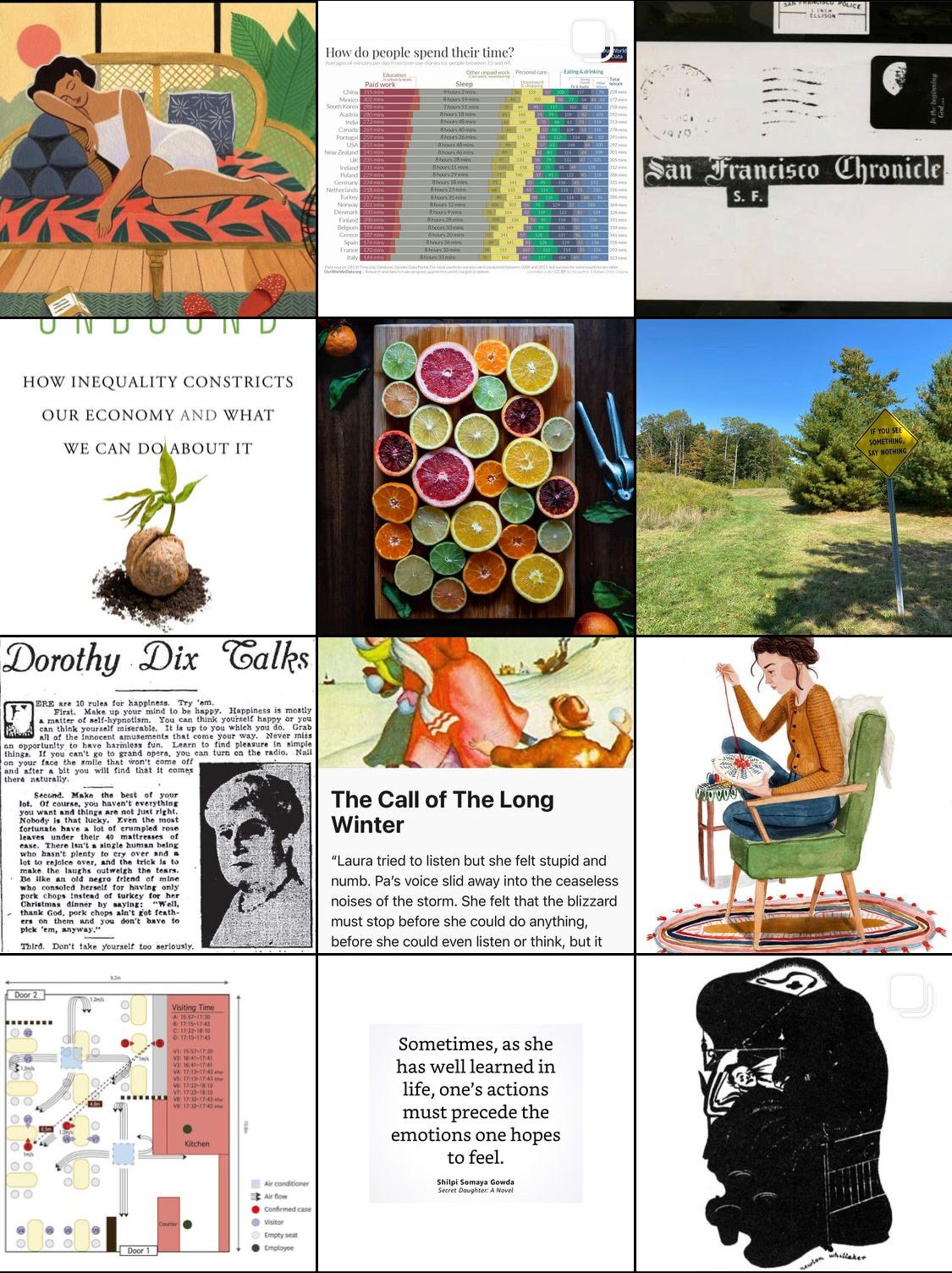#19: recording 2020 in your own way
Good morning,
I’ve been spending a lot of time cooking Hello Fresh boxes while listening to episodes of the Longform and Sugar Calling podcasts. It’s been meditative and enriching and there are so many guarantees in the process:
You are guaranteed to make a dinner that will taste good and even a little special without having to think or plan at all, which is a big deal for the novice chef
You are guaranteed wisdom, because writers are the interpreters of history (especially on Sugar Calling, where Cheryl Strayed dialogues with writers over 60 about 2020)
And you are guaranteed a 1 hour investment end-to-end because the shows take about 30 or 60 minutes, and so do the meals
In other words, you are guaranteed pride, perspective, and value.
Pride in learning to do something with your hands that has a tangible outcome (and can feed yourself or loved ones), which I think humans need to experience regularly in order to feel confident and grounded. Perspective on how our world is changing and has changed and how the wise observe such things. And value for time spent, if the above appeals to you.
I’ve also been microblogging for 13 days now, and so far I adore it. Each post takes me 10 to 30 minutes, I’m writing daily and I finally have a visual representation of bits of my own mind’s string, because my inboxes, bookmarks and notebooks are currently too cluttered with other people’s debris.
If you are a creator of any sort, I strongly recommend creating such a place for yourself, anywhere you see fit. Doing so is like keeping a diary, and if not for the sake of your art, do it for the sake of the future, privately or publicly, however you wish. Here are three reasons why.
3 thoughts from George Saunders on recording 2020
On the first episode of Sugar Calling, Cheryl speaks with her former mentor, George Saunders. (On the second, she speaks with Margaret Atwood, but I don’t think Margaret Atwood can be excerpted, so you have to just listen to her.)
Generally, each conversation is about how the writer is spending time, what they are thinking about, whether they are afraid, and what lessons we can learn from the year.
Halfway through the conversation, Saunders shares a letter that he wrote to his students at Syracuse University some months ago in which he encouraged them, as writers, to use their eyes and ears and minds because eventually, we will have to both help the world recover and make sense of the pandemic.
1-Keep records
He writes:
What new forms might you invent to fictionalize an event like this, where all of the drama is happening in private, essentially? Are you keeping records of the emails and texts you’re getting, the thoughts you’re having, the way your hearts and minds are reacting to this strange new way of living? It’s all important.
50 years from now, people the age you are now won’t believe this ever happened or will do the sort of eye roll we all do when someone tells us about something crazy that happened in 1960. What will convince that future kid is what you are able to write about this. And what you’re able to write about it will depend on how much sharp attention you’re paying now and what records you keep, also, I think with how open you can keep your heart.
2-Trivial things matter
What I love about his message is that even the most trivial things matter because we have no way of knowing what will be important to remember:
…a beautiful challenge is to keep saying everything that you think or feel or perceive, even if it seems totally trivial, might be part of the larger picture. It might be that in 100 years — or not 100 years, but say when we’re old people, you look back and it might be some totally trivial detail that actually encapsulates the whole thing. But you won’t know until you get there. And to know, you have to record it along the way, I guess.
3-Hold complexity
What can make this difficult is if we allow ourselves (our seeing selves) to be drowned out by the narratives we see in the media (news or social) that everything is good or everything is bad. Writers have to be able to hold complexity:
…I think for a writer, the complex chore of imagination is to say the world is not a complete fabric of misery right now. It’s pockets of incredible misery. And so to sort of hold that complexity in the brain is difficult. But I think it’s a form of moral responsibility to say, I don’t have to accept an outside interpretation of what’s a very complex reality, especially if it makes me more anxious and less helpful and depressed. But I think to be mindful of what pleasures there are is a really good way to make sure that when you’re needed, you’ll be ready — something like that maybe.
So, it’s not too late to write your own year-in-review or even just a few short notes, feelings or observations. News organizations will do it all month long and theirs are useful macro views but is that what you will tell your grandchildren or great grandchildren or far-future readers? I’d rather remember the details in my own way.
Jihii
Time Spent is a series of letters exploring how and why we should we read the news, among other ways to spend time. I’m also working on a book about this. You can subscribe here if you’re new. And get in touch with me here or by replying.




